NAACP slams Kay Ivey’s Confederate monuments campaign ad

The Alabama NAACP is taking a stand against Gov. Kay Ivey‘s most recent campaign ad highlighting her support of protecting the state’s Confederate monument. The group met at the capitol in Montgomery, Ala. Saturday afternoon to condemn the ad. “We’re upset about her using this campaign ad to attract voters to tell people why they should vote for her,” said Benard Simelton, the president of the Alabama NAACP, according to CNN. Silmelton believes there are a lot of other things Ivey could have made “the hallmark of her campaign.” “There are a lot of others things she could have made the hallmark of her campaign– education, our horrible criminal justice system. She could have talked about those things that are very, very important to the state of Alabama,” Simelton added. The ad in question was released by Ivey’s campaign last Tuesday as part of her election bid for a full-term as Governor. In the 30-second spot, Ivey says “when special interests wanted to tear down our historical monuments, I said no!” In response she signed a law to protect the monuments. The law, the Alabama Memorial Preservation Act, which preserves all historical monuments on public property that have been in place for at least 40 years, was passed in May 2017. Ivey’s campaign is defending the ad saying it “we shouldn’t … tear down history.” “Our ad highlights a law that was passed by the legislature and signed by the governor to protect all of our historical monuments. We can’t, and we shouldn’t change, erase or tear down history. We should learn from all of it,” the campaign said in a statement.
National ‘Ride to Revive’ Section 5 of the Voting Rights Act to leave from Selma
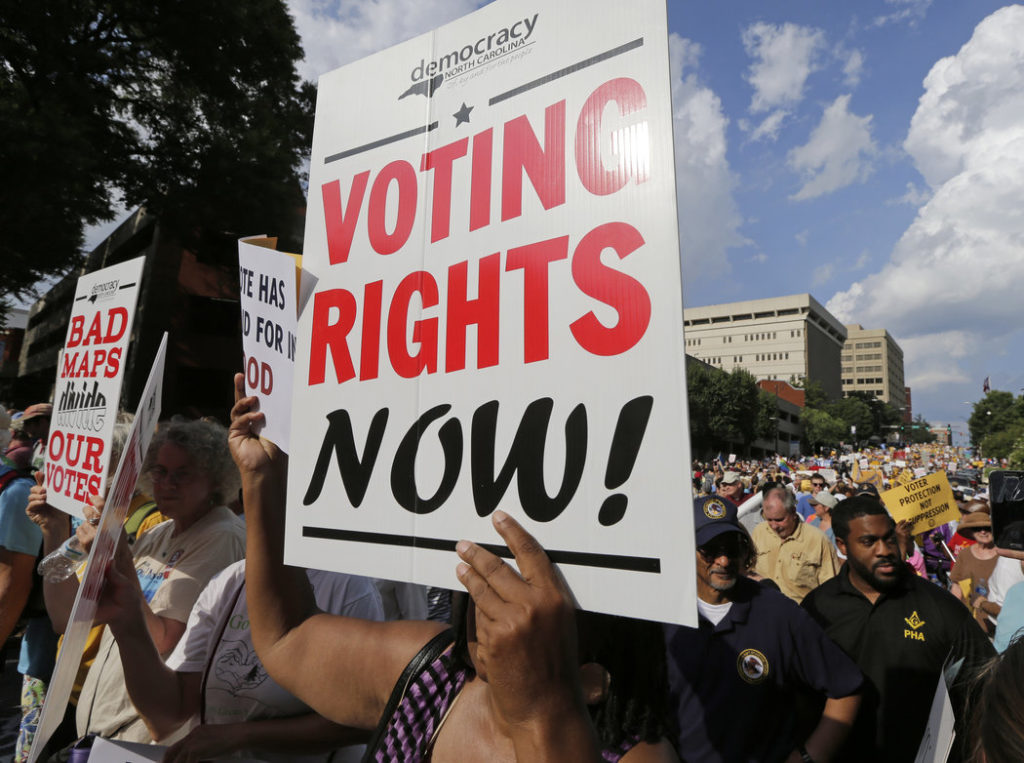
On June 24, 2017, the 4th Anniversary of the Supreme Court’s reversal of section 5 of the Voting Rights Act, advocacy groups from across the country will come together in Selma, Ala. to embark on the “Ride to Revive” — a journey to the nation’s capital where they will endeavor to draw attention to and restore the invalidated section of the Voting Rights Act. Upon their arrival to Washington, D.C. on June 27, the S.O.S. Movement for Justice & Democracy, along with a coalition of 41 organizations, including Women of Will and NAACP, will hold a rally a press conference at the U.S. Capitol to discuss the need for restoring Section 5. “Every issue is a voting issue,” Catrena Norris Carter, one of the event’s organizers, said in a press release. “Many of the massive problems we face in the South and the Nation can be addressed by progressive voting rights laws and practices. Our democracy depends on us, the people and the South.” The group will begin their trek at the historical Edmund Pettus Bridge in Selma — the site which played a critical role in securing the Voting Rights Act of 1965. On March 7 of that year, a group of roughly 525 African American protesters planned to cross the bridge on their civil rights march to Montgomery to demand the right to vote. At the bridge they were met by more than 50 state troopers and a few dozen men on horseback. When the demonstrators refused to turn back, they were brutally beaten, leaving at least 17 hospitalized, and 40 others injured. The violent attack, dubbed “Bloody Sunday,” shocked the nation and galvanized Congress to pass the Voting Rights Act, the landmark piece of federal legislation that prohibits racial discrimination in voting. In the summer of 2013, the Supreme Court invalidated a section of the law — freeing Alabama and eight other states, mostly in the South, to change election laws without advance federal approval. Prior to that these nine states had to get “pre-clearance” from the U.S. Justice Department to make changes to voting districts.
Robert Bentley paramour Rebekah Mason behind effort to shut DMV offices in black counties, new report shows

Rebekah Mason, Gov. Robert Bentley’s former top adviser and illicit lover, pushed to close 31 offices of the Alabama Department of Motor Vehicles in mostly black counties. After protests by civil rights activists, including Jesse Jackson, the politically motivated effort was later overturned, resulting in a federal investigation. The relationship between Bentley and Mason and how it impacted the DMV closure plan was the focus of a new 131-page report, which the Birmingham News reports was released by investigators examining impeachment proceedings against the governor. The report, from lead investigator Jack Sharman, found Mason “proposed closing multiple driver’s license offices throughout the State” and asking Alabama Law Enforcement Agency to “put together a plan.” Sharman also noted that former ALEA head Spencer Collier – well-aware of Mason’s intent – was instructed to have a plan “rolled out in a way that had limited impact on Government Bentley’s political allies.” Collier reported the closure plan to Luther Strange, Alabama’s then-Attorney General, expressing concern over possible Voting Rights Act violations. The News reports that Collier eventually agreed to the closure plan, but through “objective measure based on processed transactions per year to determine which offices to close.” Mason’s plan, if enacted, would of save the state $200,000 – a small amount in a General Fund showing typical annual shortfalls between $100 million and $200 million. Bentley agreed to the plan, the report said, with a single exception: removing state Sen. Gerald Dial’s district from the list. Dial told the News he never spoke with Bentley about any closures and is not aware of which county was under consideration. The plan set off an investigation by the U.S. Department of Transportation, which discovered that the closures would hit rural counties hardest and disproportionately affect black neighborhoods, a violation of the 1964 Civil Rights Act. The NAACP, the nation’s leading civil rights organization, filed a lawsuit prompting the federal review. At first, Bentley was critical of DOT involvement in the investigation, which he said was political in nature. But after striking an agreement between state and federal agencies, ALEA agreed it would extend service hours for DMV offices in Alabama’s so-called “Black Belt.”
NAACP sounds alarm on ‘decline’ in civil rights commitment
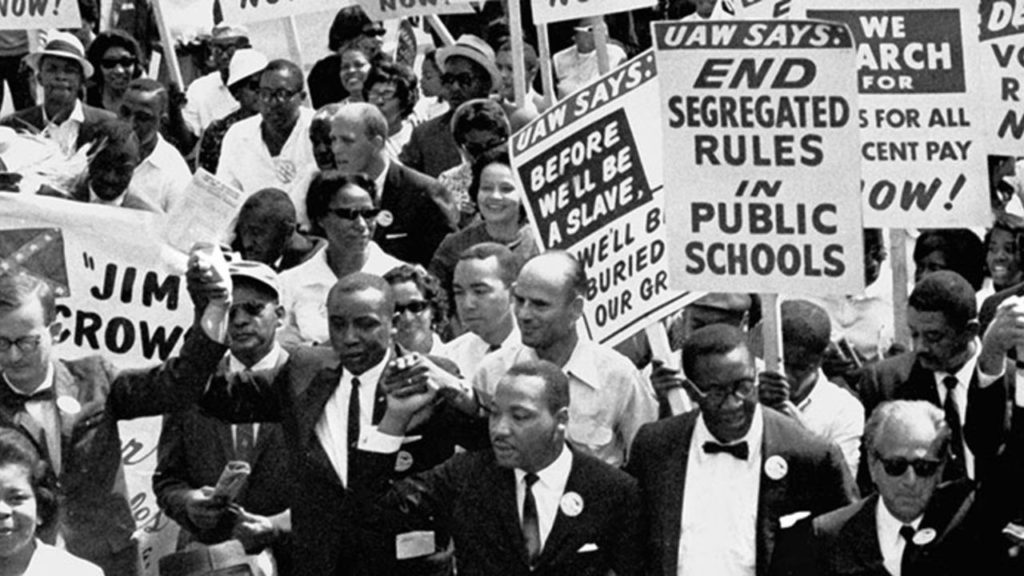
The head of the NAACP says he met with Attorney General Jeff Sessions over concerns that recent policy changes “signal a threatening decline” in the Justice Department’s commitment to civil rights. The Friday meeting came after Sessions suggested the agency would pursue fewer federal investigations of troubled police departments. The Justice Department this week also abandoned an Obama-era challenge to a key aspect of Texas’ voter ID law that is among the toughest in the nation. NAACP President Cornell William Brooks says those changes are troubling. He says they “imply a disturbing departure” from the Justice Department’s enforcement of civil rights laws. Sessions said this week that too much federal scrutiny on police departments could cause officers to be less effective in crime-fighting. The Justice Department did not immediately comment on the meeting. Republished with permission of The Associated Press.
NAACP continues protests outside of Sen. Sessions’ office
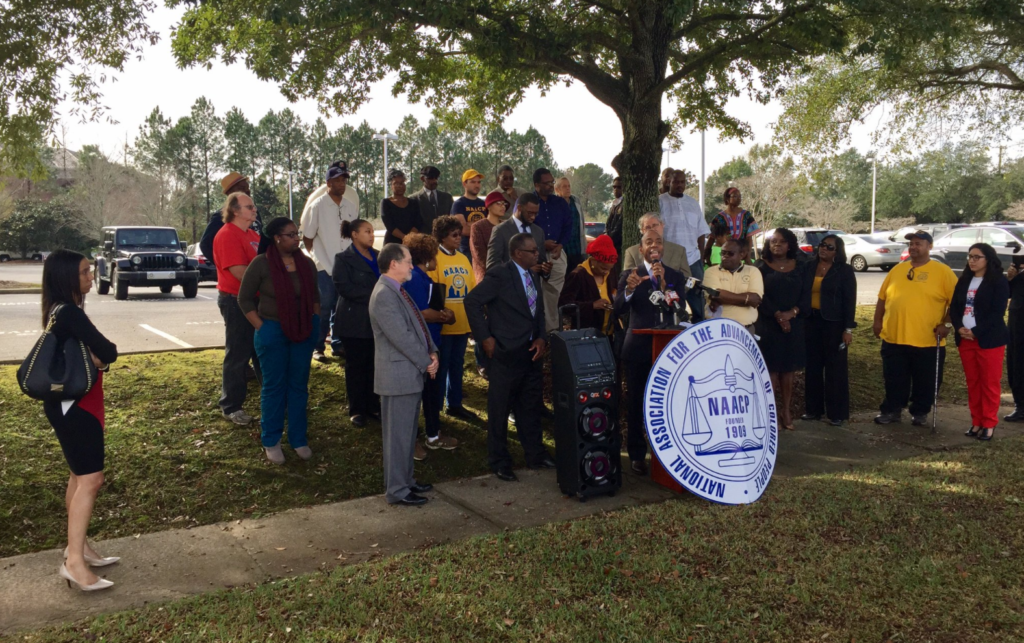
NAACP demonstrators continued their protests outside of the Alabama offices of Alabama Sen. Jeff Sessions on Monday, calling for him to turn down his controversial nomination to become the next U.S. Attorney General in President-elect Donald Trump‘s administration. Just hours before Sessions’ confirmation hearings are schedule to begin, the outspoken group criticized the Senator’s record and views on civil rights, including those of women, immigrant, and LGBT communities, as well as his record on criminal justice reform and voting rights enforcement. Trump’s November decision to tap Sessions, 70, drew immediate rebuke from the NAACP. After initially making public statements objecting to Sessions’ nomination, the NAACP turned to civil disobedience, which led to six arrests last week and now public protests. The @NAACP & @AlabamaNAACP are occupying the Mobile office of @jeffsessions–untill he withdraws as a AG nominee or we’re arrested.@tvonetv pic.twitter.com/7uceDDpz1Y — Cornell Wm. Brooks (@CornellWBrooks) January 3, 2017
Email insights: Civil, Human Rights Coalition strongly opposes Jeff Sessions for AG
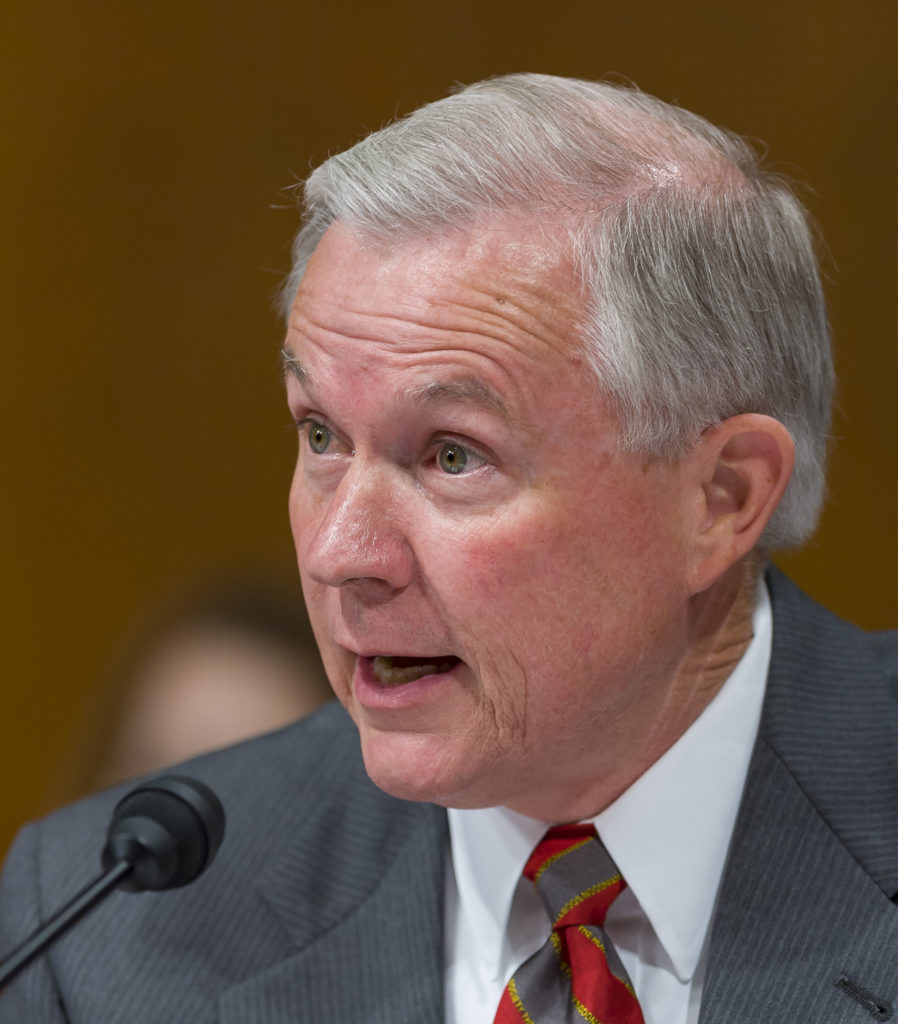
The Conference on Civil and Human Rights sounded off on the appointment of Alabama Republican Sen. Jeff Sessions as attorney general in a Friday email. “This nomination is deeply troubling to Americans who care about equal protection under the law,” group president Wade Henderson said in the email. “Throughout his tenure in the Senate, Sen. Sessions has been one of the chamber’s leading antagonists of immigrants and the LGBT community, continuing his long record of obstructing civil rights that began in his tenure as U.S. Attorney for the Southern District of Alabama.” Sessions was long thought to be Donald Trump’s top pick for secretary of defense, but the incoming president announced Friday that the third-term Alabama senator would be nominated as attorney general. Trump also announced Friday that Kansas Republican Rep. Mike Pompeo would be nominated as CIA director. Henderson said Sessions’ “record of hostility to voting rights as U.S. Attorney is particularly egregious.” “He called a white voting rights litigator a ‘disgrace to his race,’ retaliated against voting rights advocates by wrongly charging them with crimes, and proclaimed the Voting Rights Act ‘intrusive,’” Henderson said. “He also once declared that the Ku Klux Klan was ‘OK’ but that the National Council of Churches, the NAACP, and the Southern Christian Leadership Conference were ‘un-American.’” Henderson closed the email by saying Trump should pick someone else to serve as attorney general or the U.S. Senate should shoot down Sessions’ nomination.
Lawsuit seeks to balance Alabama’s all-white courts

A civil rights group is suing over Alabama’s system of electing appellate judges by statewide vote, which they contend has resulted in vote dilution and yielded all-white courts despite the fact Alabama has the sixth-largest black population in the country, where one of every four people is African-American. The Lawyers’ Committee for Civil Rights Under Law (Lawyers’ Committee), filed a lawsuit on behalf of the Alabama State Conference of the NAACP and four individual black voters alleging that the method of electing Alabama’s most powerful judges violates the Voting Rights Act. The suit maintains Alabama’s statewide method of electing members of the Alabama Supreme Court, Court of Criminal Appeals, and Court of Civil Appeals deprives the African-American community of the ability to elect any judges of their choice. “In 2016, Alabama’s appellate courts are no more diverse than they were when the Voting Rights Act was signed more than 50 years ago,” said Kristen Clarke, president and executive director of the Lawyers’ Committee. “It is time for the highest courts in the state of Alabama to reflect the diversity of the communities they serve. This lawsuit seeks to provide African-American voters an equal opportunity to elect judges of their choice, achieve long-overdue compliance with the Voting Rights Act, and instill greater public confidence in the justice system of Alabama.” The Supreme Court of Alabama has nine members and is the state’s court of last resort. Alabama’s intermediate appellate courts, the Court of Criminal Appeals and the Court of Civil Appeals, each has five members. All 19 judges are elected statewide. Currently, all 19 judges are white. “The Alabama NAACP continues to fight for equitable representation of all communities in our judicial system at all levels,” said Benard Simelton, president of the Alabama NAACP. “Alabama cannot continue to have a system that ignores segments of the community. We believe that a revised method of electing judges will lead to representation of all segments of the community.” “The fact that no African-Americans are on the Alabama Supreme Court or any other office elected statewide sends a clear message that black Alabamians remain subordinate to whites in state government, just as the 1901 Constitution intended,” said James Blacksher, long-time Alabama civil rights attorney and partner in the lawsuit. In the history of Alabama, only two African-Americans have won an election to statewide office. Every other black statewide candidate has been defeated by a white candidate. Alabama’s appellate judges have been all-white for 15 years.
KKK distributes fliers in Mobile featuring Martin Luther King Jr.

During the weekend the Loyal White Knights of the Ku Klux Klan, based in Pelham, North Carolina, distributed fliers throughout Mobile, Alabama, referencing Dr. Martin Luther King Jr. The fliers were found by residents, and promptly discarded, only one day before the country celebrated King’s legacy Monday. The fliers, like ones previously distributed across the state, were in plastic bags and found on lawns throughout the city’s Midtown neighborhood. In 2014, fliers were distributed throughout Tallassee and, in 2015, similar flyers were distributed in Selma on the 50th anniversary of Bloody Sunday. According to multiple reports, the fliers contained a “happy birthday” message to King and further said “The blacks have NAACP, the Mexicans have La Raza, the Jews have JDL, and white people have the KKK.” Though a phone call to the group was unsuccessful, the voice mailbox opened with: “Hey whitey, how do you feel about this Martin Luther King Day?” The message went on to disparage King in a variety of ways, using expletives and insulting racist language. It also urged the day be used to celebrate the legacy of Gen. Robert E. Lee. The group’s website calls itself an organization for “White Christian Men & Women Working to Secure A Future, For Pure White Americans” and rejects assertions it’s a hate group. If any of the fliers’ distributors are found, criminal littering charges could be levied, police said.
NAACP sues Alabama over its voter ID law
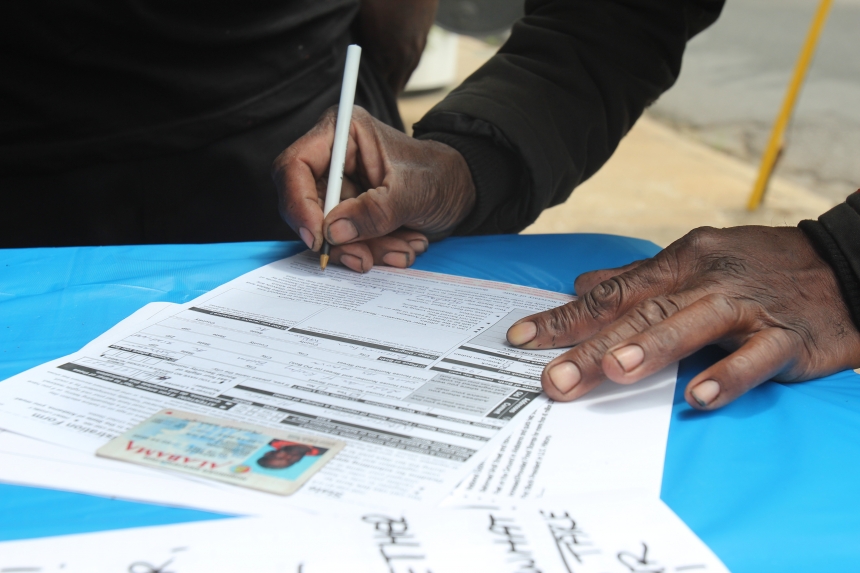
A civil rights group has filed a lawsuit against the state of Alabama, claiming that its law requiring voters to have photo identification will prevent thousands from casting ballots. The National Association for the Advancement of Colored People and Greater Birmingham Ministries filed the federal lawsuit Wednesday. The lawsuit cites state estimates that at least 280,000 people will be disenfranchised because of the law. The complaint says those affected are disproportionately black and Hispanic, and it says that amounts to intentional racial discrimination. The state attorney general’s office had no immediate comment. A requirement that went into effect last year requires voters to show valid, state-issued photo identification at polling places. The state’s Republican-controlled Legislature approved the law in 2011, saying it was meant to prevent fraud. Republished with permission of The Associated Press.
NAACP suggests removal of Confederate flag from Alabama trooper uniforms

An Alabama chapter of the NAACP says it’s time to remove the Confederate battle flag from state troopers’ uniforms and patrol vehicles. Rev. Robert Shanklin of the NAACP’s Huntsville chapter told local media the flag is offensive and should not be included in uniforms state troopers wear or on the vehicles they drive. The battle flag is part of the Alabama state seal. The flag has come under renewed scrutiny since nine black churchgoers were fatally shot during Bible study in Charleston, South Carolina. The man charged in the shooting had been photographed with the flag numerous times. Some have said the flag represents Southern heritage. Others have said the symbol is divisive and white supremacy is at the heart of the heritage the flag represents. Republished with permission of The Associated Press.
Talladega looks to ban sagging pants

Should terrible fashion choices be outlawed? If so after we ban sagging pants can we re-evaluate the high-waisted Daisy-Duke cutoff jeans that young women wear these days? Joining a long line of cities before them the Talladega City Council is renewing a previous look into a resident’s request to ban sagging pants. The Anniston Star reports that resident Paul Johnson became concerned about the way sagging pants effects the community as a whole. He told the newspaper he considers them disrespectful, specifically to his granddaughter and the women in town. He asked that a ban be put in place and that punishments for violating it have teeth. Johnson told the Star, “I care about my community, about how and where I live. I want to teach my granddaughter what’s right, but we can’t do that if (sagging) is what she sees in public. If we don’t do something, it’s just going to get worse.” Bans on sagging pants have been proposed throughout the nation including in Talladega in the past. Last year, Ocala, Fla., passed a ban but repealed it when the NAACP threatened legal action. Even President Barack Obama weighed in on the issue. As a candidate in 2008 he said, ““Here’s my attitude: I think passing a law about people wearing sagging pants is a waste of time.” He did however go on to say, “Having said that, brothers should pull up their pants. You’re walking by your mother, your grandmother, and your underwear is showing. … What’s wrong with that? Come on. There are some issues that we face that you don’t have to pass a law [against], but that doesn’t mean folks can’t have some sense and some respect for other people. And, you know, some people might not want to see your underwear: I’m one of them.” Councilors have said they will hold public meetings on the issue and have the new city manager look into it when he starts. I’m hoping this issue only comes up just after the city gets to all the other important ones like actual crimes, poverty, hunger, etc.


